Related Research Articles
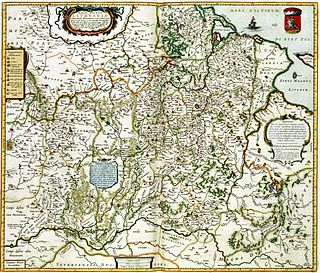
The history of Lithuania dates back to settlements founded many thousands of years ago, but the first written record of the name for the country dates back to 1009 AD. Lithuanians, one of the Baltic peoples, later conquered neighboring lands and established the Grand Duchy of Lithuania in the 13th century. The Grand Duchy was a successful and lasting warrior state. It remained fiercely independent and was one of the last areas of Europe to adopt Christianity. A formidable power, it became the largest state in Europe in the 15th century through the conquest of large groups of East Slavs who resided in Ruthenia. In 1385, the Grand Duchy formed a dynastic union with Poland through the Union of Krewo. Later, the Union of Lublin (1569) created the Polish–Lithuanian Commonwealth that lasted until 1795, when the last of the Partitions of Poland erased both Lithuania and Poland from the political map. After the dissolution, Lithuanians lived under the rule of the Russian Empire until the 20th century, although the were several major rebellions, especially in 1830–1831 and 1863.
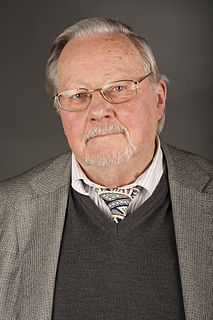
Vytautas Landsbergis[ˈvʲîːtɐʊtɐs ˈɫɐ̂ˑnʲdzʲbʲɛrʲɡʲɪs](listen) is a Lithuanian politician and former Member of the European Parliament. He was the first Head of Parliament of Lithuania after its independence declaration from the Soviet Union. He has written 20 books on a variety of topics, including a biography of Mikalojus Konstantinas Čiurlionis, as well as works on politics and music. He is a founding signatory of the Prague Declaration on European Conscience and Communism, and a member of the international advisory council of the Victims of Communism Memorial Foundation.

Vytautas Magnus University (VMU) is a public university in Kaunas, Lithuania. The university was founded in 1922 during the interwar period as an alternate national university.
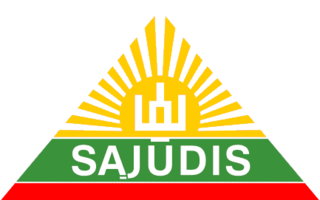
Sąjūdis, initially known as the Reform Movement of Lithuania, is the political organisation which led the struggle for Lithuanian independence in the late 1980s and early 1990s. It was established on 3 June 1988, and was led by Vytautas Landsbergis. Its goal was to seek the return of independent status for Lithuania.
Lithuanian Activist Front or LAF was a short-lived resistance organization established in 1940 after Lithuania was occupied by the Soviet Union. The goal of the organization was to liberate Lithuania and re-establish its independence. It planned and executed the June Uprising and established the short-lived Provisional Government of Lithuania. The Government self-disbanded and LAF was banned by Nazi authorities in September 1941. LAF remains controversial due to its anti-Semitic and anti-Polish positions.
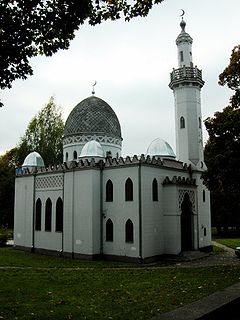
Islam in Lithuania, unlike many other northern and western European countries, has a long history starting from 14th century. The medieval Grand Duchy of Lithuania of the Polish–Lithuanian Commonwealth, stretching from Baltic to Black seas, included several Muslim lands in the south inhabited by Crimean Tatars. A few Muslims migrated to ethnically Lithuanian lands, now the current Republic of Lithuania, mainly under rule of Grand Duke Vytautas. The Tatars, now referred to as Lithuanian Tatars, lost their language over time and now speak Lithuanian; however, they maintained Islam as their religion. Due to the long isolation from all the greater Islamic world, the practices of the Lithuanian Tatars differ somewhat from the rest of Sunni Muslims; they are not considered a separate sect, however, although some of the Lithuanian Tatars practice what could be called Folk Islam. One anonymous Lithuanian Tatar who made Hajj to Mecca acknowledged in his work the Risȃle that the Lithuanian Tatars had unorthodox customs and rituals so that they could possibly be viewed as infidel (kafir) from the perspective of orthodox Muslims.

The January Events took place in Lithuania between 11 and 13 January 1991 in the aftermath of the Act of the Re-Establishment of the State of Lithuania. As a result of Soviet military actions, 14 civilians were killed and 702 were injured. The events were centered in its capital, Vilnius, along with related actions in its suburbs and in the cities of Alytus, Šiauliai, Varėna, and Kaunas.
Lithuanian law is a part of the legal system of Lithuania. It belongs to the civil law legal system, as opposed to the common law legal system. The legal system of Lithuania is based on epitomes of the French and German systems. The Lithuanian legal system is grounded on the principles laid out in the Constitution of the Republic of Lithuania and safeguarded by the Constitutional Court of the Republic of Lithuania.

The Holocaust in Lithuania resulted in the near total destruction of Lithuanian (Litvaks) and Polish Jews, living in Generalbezirk Litauen of Reichskommissariat Ostland within the Nazi-controlled Lithuanian SSR. Out of approximately 208,000–210,000 Jews, an estimated 190,000–195,000 were murdered before the end of World War II, most between June and December 1941. More than 95% of Lithuania's Jewish population was massacred over the three-year German occupation—a more complete destruction than befell any other country affected by the Holocaust. Historians attribute this to the massive collaboration in the genocide by the non-Jewish local paramilitaries, though the reasons for this collaboration are still debated. The Holocaust resulted in the largest-ever loss of life in so short a period of time in the history of Lithuania.

The Lithuanian partisans were partisans who waged a guerrilla warfare in Lithuania against the Soviet Union in 1944–1953. Similar anti-Soviet resistance groups, also known as Forest Brothers and cursed soldiers, fought against Soviet rule in Estonia, Latvia, Poland, Romania and Galicia. It is estimated that a total of 30,000 Lithuanian partisans and their supporters were killed. Lithuanian partisan war lasted almost for a decade, thus being one of the longest partisan war in Europe.

Jonas Žemaitis was one of the leaders of the Lithuanian partisans, armed resistance against the Soviet occupation of Lithuania, and acknowledged as the head of state by independent Lithuania.
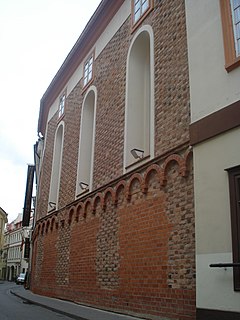
The Genocide and Resistance Research Centre of Lithuania is a state-funded research institute in Lithuania dedicated to "the study of genocide, crimes against humanity, and war crimes in Lithuania; the study of the persecution of local residents by occupying regimes; the study of armed and unarmed resistance to occupying regimes; the initiation of the legal evaluation of the activities of the organisers and implementers of genocide; and the commemoration of freedom fighters and genocide victims." The centre was founded on 25 October 1992 by the Supreme Council of the Lithuanian Republic as the "State Genocide Research Centre of Lithuania". It is a member organisation of the Platform of European Memory and Conscience.
The double genocide theory is the idea that two genocides of equal severity occurred in Eastern Europe, the Nazi Holocaust against Jews and a second genocide that the Soviet Union committed against the local population. The theory first became popular in the Baltic States during the 1990s. Some versions of the theory furthermore accuse Jews of complicity in Soviet repression and therefore characterize local participation in the Holocaust as retaliation. Alexander Karn states that the idea of "double genocide... hinge[s] upon the erasure of Lithuanian participation in the Holocaust."

The Way of Courage is a populist political party in Lithuania. It was founded in 2012 and has an anti-corruption platform.

Lithuania competed at the 2013 Summer Universiade in Kazan, Russia from 6 to 17 July 2013.
The Lithuanian Helsinki Group was a dissident organization active in the Lithuanian SSR, one of the republics of the Soviet Union, in 1975–83. Established to monitor the implementation of the Final Act of the Conference on Security and Cooperation in Europe, better known as Helsinki Accords, it was the first human rights organization in Lithuania. The group published over 30 documents that exposed religious repressions, limitations on freedom of movement, political abuse of psychiatry, discrimination of minorities, persecution of human right activists, and other violations of human rights in the Soviet Union. Most of the documents reached the West and were published by other human rights groups. Members of the group were persecuted by the Soviet authorities. Its activities diminished after it lost members due to deaths, emigration, or imprisonment, though it was never formally disbanded. Some of the group's functions were taken over by the Catholic Committee for the Defense of the Rights of Believers, founded by five priests in 1978. Upon his release from prison, Viktoras Petkus reestablished the Lithuanian Helsinki Group in 1988.
The Lithuanian order of precedence is a nominal and symbolic hierarchy of important positions within the Government of Lithuania. Administered by the Ministry of Foreign Affairs, the hierarchy does not determine the order of succession for the office of President of the Republic of Lithuania, which is instead specified by the Constitution of Lithuania.

Jonas Noreika, also known by his post-war nom de guerre Generolas Vėtra, was a Lithuanian anti-Soviet partisan, military officer, and Nazi collaborator.

Vytautas Antanas Matulevičius is a Lithuanian journalist, publicist, political figure and a former member of the Seimas.
References
- 1 2 Apeliacinis teismas: buvęs sovietų saugumietis Vytautas Vasiliauskas pagrįstai nuteistas genocido byloje, 15min.lt
- ↑ CASE OF VASILIAUSKAS v. LITHUANIA 35343/05 | Judgment (Merits and Just Satisfaction) | Court (Grand Chamber) | 20/10/2015